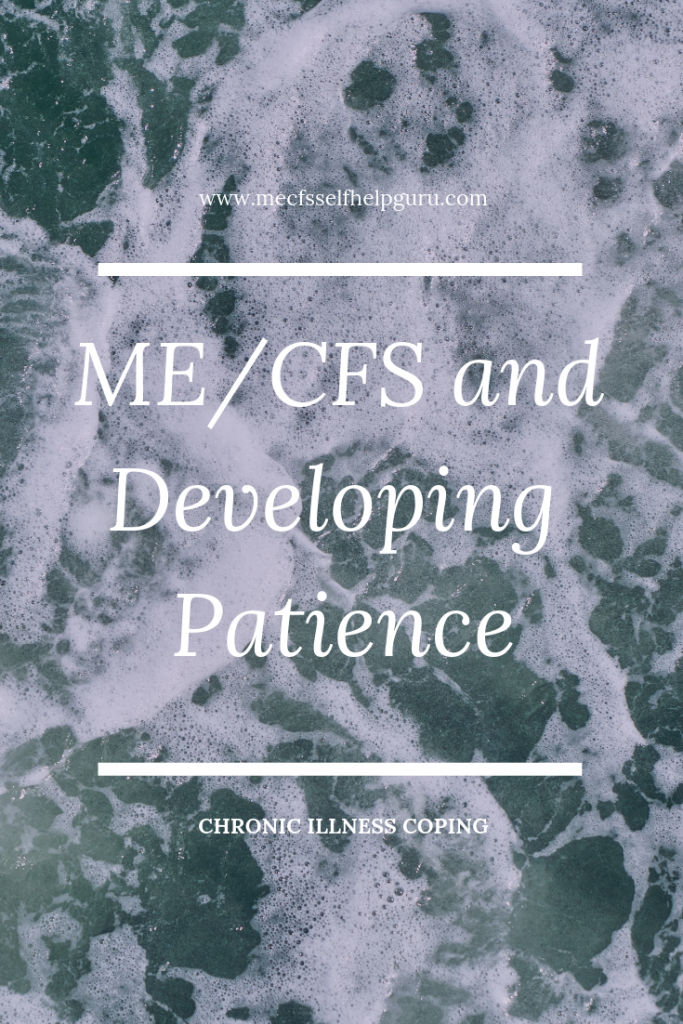Patience is a very important quality to cultivate when you have a ME/CFS. We regularly face challenges that would test anybody’s patience and the consequence of letting them get to us only serve to worsen our health. Any time we get wound up or impatient we’re adding to the problems with our sympathetic nervous system overdrive, taking our bodies’ precious resources away from important functions such as digestion and immunity.
I find patience is most regularly called for when I have a setback: when I feel too unwell to do my usual daily stuff, sometimes even too unwell to do the things I know will help me. These times can be really frustrating, but I know that dwelling on frustration will only make things worse. So once I’ve acknowledged and accepted my frustration I employ my patience. I cut right back on my activity and I wait to feel better. I wait for that little bit of energy to come so that I can invest in the things that do me good. Then I wait for those things to take effect and bring me back up to baseline.
There are three keys to developing patience: acceptance, letting go of rigid expectations and making the best of the here and now. I first had to develop patience when backpacking around east Africa over 20 years ago. We soon discovered that transport timetables didn’t really mean anything and a ‘matatu’ that was expected ‘soon’ could mean anytime that day! The first time I had to wait 3 hours it did nothing for my mood. However, once I learned to accept that that was the way things were, I released myself from the expectation of getting somewhere by a particular time. I also relaxed and made the most of the wait, interacting with the locals, studying Swahili, reading or making friendship bracelets.
Rather less exotically, once we accept that our body is struggling at the moment, we can let go of the expectations of what we thought we could do with it. We can relax and settle into waiting to get better by making ourselves as comfortable as possible, focusing on how we can make the here and now as enjoyable as possible. Patience means letting go of what we really want to be able to do (for now) and paying our full attention to the positives of the moment.
Another aspect to patience is trust. In order to wait patiently you have to believe that you will get where you want to in the end, or that you’ll make the most of whatever occurs if you don’t. Part of the anxiety of that first 3 hours ‘matatu’ wait was the worry that it wouldn’t come at all, or that perhaps we were waiting in the wrong place and had missed it. When we learned to trust that it would come eventually it became a lot easier to wait. The same goes for this illness. If we can trust that we will improve, that we will find a way to manage this illness and improve our quality of life, it becomes much easier to employ the patience we need to do so.
Often when we get impatient with others it’s because we don’t accept their fallibility or the difficult constraints they might be dealing with. Sometimes we have too rigid expectations of them, or are handing over too much responsibility to them. Sometimes we get impatient because we just don’t trust in a positive outcome and feel that we’re wasting our time. If you want to develop patience with somebody around you (a doctor, a carer etc.) think about how you can become more accepting of them as a human who also has faults and constraints. Can you loosen up your expectations? Take a bit more responsibility for getting your needs met? Have a back-up plan if you don’t trust them to get you where you want? Or just trust that you’ll get there eventually and that if this situation doesn’t work out for you, you’ll learn what you can from it and move on to the next!
A small favour: Could you rate this article using the stars below the related posts? Thank you!





